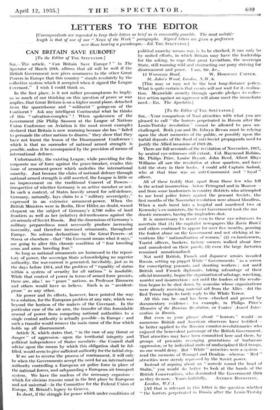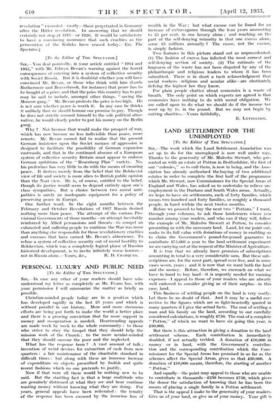[To the Editor of THE SPECTATOR.]
SIR,—Your comparison of Nazi atrocities with what you are pleased to call " the horrors perpetrated in Russia after the Lenin-Trotsky revolution " cannot be allowed to pass un- challenged. Both you and Mr. Edwyn Bevan must be relying upon the short memories of the public, or possibly upon the turbid deposits of the flood of anti-Soviet propaganda used to justify the Allied invasions of 1918-20.
There are full accounts of the reVnition of November, 1917, by neutral eye-witnesses still extant. Col. Raymond Robins, Mr. Philips Price, Louise Bryant, John Reed, Albert Rhys Williams all saw the revolution at close quarters, -and have told the story in their books. I could add Captain Sadoul, who at that time was an anti-Communist and " loyal " officer.
All of these testify that, apart from those few who fell in the actual insurrection--before Petrograd and in Moscow-- and from some landowners in country districts who attempted to use local police forces against the peasant Soviets, the first months of the November revolution were almost bloodless. When a mob burst into a hospital and murdered two of Kerensky's ex-ministers, the Soviet Government took the nio drastic measures, having the ringleaders shot.
It is unnecessary to resort even to these eye-witnesses to ascertain that (l) the capitalist newspapers like Zaria Rossii and others continued to appear for over five months, pouring the foulest abuse on the Government and not sticking at in- ventions like " nationalization of women," (2) ex-landowners, Tsarist officers, bankers. factory owners walked about free and unmolested on their parole, (3) even the large factories remained unnationalized.
Not until British, French and Japanese armies invaded Russia, setting up puppet White " Governments " as a screen for conscripting peasants and shooting workers : not until British and French diplomats, taking advantage of their official immunity, began the organization of sabotage, wrecking, murder and insurrection : not until the leaders of the revolu- tion began to be shot down, by assassins whose organizations Were already receiving material aid from the Allies. —did the Red Terror begin its tardy reply to the White Terror.
All this can be—and has been—checked and proved by documentary evidence : for example, in Philips Price's Memoirs of the Russian Revolution, or Coates' Armed Inter- vention in Russia.
But even so your phrase about " horrors " would—as numerous British and American observers have testified— be better applied to the Russian counter-revolutionaries who enjoyed the benevolent patronage of the British Government. That atrocities may have been committed here and there, by groups of peasants revenging generations of barbarous oppression, or by individual units of undisciplined Red troops, no one would deny. But " White " atrocities were a system -- read the mernoirs of Wrangel and Denikin—whereas " Red " atrocities were sternly repressed by the Soviet power.
Instead of arguing about an " aureole round the head of Stalin," you would do better to look at the hands of the British Conservatives, who dominated the Government then as they do now.—Yours faithfully, ANDREW ROTHSTEIN. London, W.C.1.'
[All that is relevant in this letter is the question whether " the horrors perpetrated in Russia after the Lenin-Trotsky
revolution" exceeded--vastly—those perpetrated in Germany after the Hitler revolution. In answering that we should certainly not stop at 1917—or 1920. It would be satisfactory to have a convincing assurance that such cruelties as the persecution of the Kulaks have ceased today.—En. The Spectator.]



















































 Previous page
Previous page